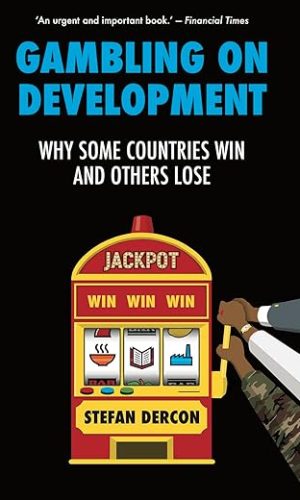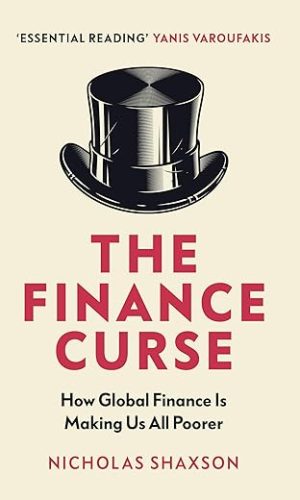International Economics
-
Adventures Of A Modern Renaissance Academic In Investing And Gambling, The: William T Ziemba (UBC): 12 (World Scientific Series in Finance)
This book tells the story of how financial markets have evolved over time and became increasingly more complex. The author, a successful and experienced trader, who among other things won the 2015 battle of the quants futures contest held in New York, shares how one can navigate today’s dangerous financial markets and be successful. Readers at all levels will benefit from his analysis and many real life examples and experiences. The coverage is broad and there is considerable discussion on ways to stay out of trouble, protect oneself and grow one’s assets. The author was the first one to do turn of the year January effect trades in the futures markets starting in the beginning of S&P 500 futures trading in 1982. That has been successful and the author explains his ideas and experiences from the beginning in simple markets to the current, very complex markets we have in 2017.
The author discusses the various ways that traders and investors lose money in the financial markets. Many examples are provided, including Long Term Capital Management, ENRON, Amarath, Neiderhoffer’s funds and many major companies such as Lehman Brothers, Society Generale, Saloman Brothers. This is invaluable to understanding ways to avoid such losses.
The author discusses great investors and their methods and evaluation and the authors work with several of them. Risk arbitrage and mean reversion strategies are described through actual use. Asset-liability models for pension funds, insurance companies and other financial institutions devised by the author are described. The author uses racetrack bias ideas in behavorial finance in trading index futures and options. Large stock market crashes that can be predicted are discussed with several models of the author and others. Eight mini crashes including the January-February 2016, Brexit and the Trump election that are plausible but largely unpredictable are described and how they were dealt with successfully.
Along with ways to deal with them, investment in top quality racehorses, oriental carpets, real estate and other interesting investments are covered. The author was instrumental in viewing racing as a stock market. The ideas are used by the top racing syndicates as well as hedge funds.
The book proceeds by weaving these aspects of the financial markets in the modern era into a story of the author’s academic, professional and personal life. This is told through the people he met and worked with and the academic and personal travel he had all over the world this past half century. The text is simply written with details, sources and references in the notes of each chapter. Details of various important events and how they evolved are described. There are numerous color and black and white photos in the text plus graphs, tables etc. in the notes to tell the story. The teaching and research into various financial and gambling markets takes the reader to interesting places around the world. These include the US and its many stock market ups and downs, Japan when they were ruling the financial world and then they collapsed, the UK visits with lectures, teaching and research work at their great Universities including Cambridge and Oxford, Europe with many activities in France, Italy, Germany and other places, to Asia including discussions about travels to Persia, Turkey, Singapore, Korea, China, Afghanistan, Russia and other countries. His work with horse racing syndicates took him to Australia and Hong Kong. Crises like those in Greece, US housing and internet and the flash crash are discussed.
Read more
£31.60 -
Gambling on Development: Why Some Countries Win and Others Lose
In the last thirty years, the developing world has undergone tremendous changes. Overall, poverty has fallen, people live longer and healthier lives, and economies have been transformed. And yet many countries have simply missed the boat. Why have some countries prospered, while others have failed? Stefan Dercon argues that the answer lies not in a specific set of policies, but rather in a key ‘development bargain’, whereby a country’s elites shift from protecting their own positions to gambling on a growth-based future. Despite the imperfections of such bargains, China is among the most striking recent success stories, along with Indonesia and more unlikely places, such as Bangladesh, Ghana and Ethiopia. Gambling on Development is about these winning efforts, in contrast to countries stuck in elite bargains leading nowhere. Building on three decades’ experience across forty-odd countries, Dercon winds his narrative through Ebola in Sierra Leone, scandals in Malawi, beer factories in the DRC, mobile phone licences in Mozambique, and relief programmes behind enemy lines in South Sudan. Weaving together conversations with prime ministers, civil servants and ordinary people, this is a probing look at how development has been achieved across the world, and how to assist such successes.Read more
£14.50£15.20 -
Getting Started in Technical Analysis: 19
Revered by many, reviled by some, technical analysis is the art and science of deciphering price activity to better understand market behavior and identify trading opportunities. In this accessible guide, Jack Schwager-perhaps the most recognized and respected name in the field-demystifies technical analysis for beginning investors, clearly explaining such basics as trends, trading ranges, chart patterns, stops, entry, and exit and pyramiding approaches. The book’s numerous examples and clear, simple explanations provide a solid framework for using technical analysis to make better, more informed investment decisions and as the basis for mechanical trading systems. Along with Schwager’s invaluable trading rules and market observations culled from years of real-world trading experience, Getting Started in Technical Analysis offers in-depth coverage of:
* Types of charts-bar, close-only, point-and-figure, candlestick.
* Chart patterns-one-day, continuation, top and bottom formations, the importance of failed signals.
* Trading systems-trend-following, counter-trend, pattern recognition.
* Charting and analysis software-price data issues, time frame/trading style considerations, software research.
* he planned trading approach-trading philosophy, choosing markets, risk control strategies, establishing a trading routine.Read more
£15.70£17.10Getting Started in Technical Analysis: 19
£15.70£17.10 -
Money: Know More, Make More, Give More: Learn how to make more money and transform your life
Do you want to get to the stage – soon – where you are truly financially independent, able to use your money in the way you’d like, and be completely confident in your ability to take care of yourself and your family?
That is a universal desire, but many of us regard wealth and financial independence as a goal which we’ll likely never achieve – there are just too many bills that need paying and there is a widespread belief that the money game is rigged. Even people who win the lottery or inherit money often seem to wind up losing it. The evidence suggests you can’t win a game that you don’t understand – even if you start out winning – because you never understood the game in the first place.
So how can you win with money? How can you create independent wealth and hold on to it? This inspiring book by self-made multi-millionaire Rob Moore explains the rules of the game, shares simple tricks for managing money better, details how to create a plan for an ambitious future, and shows you the very best way to become a millionaire – to think and behave like one!
Read more
£7.30£10.40 -
Private Equity and Venture Capital in Europe: Markets, Techniques, and Deals
Private Equity and Venture Capital in Europe: Markets, Techniques, and Deals, Third Edition introduces private equity, investments and venture capital markets while also presenting new information surrounding the core of private equity, including secondary markets, private debt, PPP within private equity, crowdfunding, venture philanthropy, impact investing, and more. Every chapter has been updated with new data, cases, examples, sections and chapters that illuminate elements unique to the European model. With the help of new pedagogical materials, this updated edition provides marketable insights about valuation and deal-making not available elsewhere.
As the private equity world continues to undergo many challenges and opportunities, this book presents both fundamentals and advanced topics that will help readers stay informed on market evolution.
- Provides a unique focus on Europe for equity investors and long-term investments
- Contains theoretical knowledge put into practice using with real-world cases and the language and the methodologies of practitioners
- Presents structured topics that help readers understand increasing levels of difficulty
- Includes learning tools such as mini-cases, call-outs and boxes that recall previously presented definitions throughout chapters
Read more
£56.00£57.90 -
The Finance Curse: How global finance is making us all poorer
This is a book that none of us can afford to ignore – an agenda-setting, campaigning investigation that shows how global finance works for the few and not the many.
** A Financial Times Book of the Year **
‘Essential reading’ YANIS VAROUFAKISWe need finance – but when finance grows too big it becomes a curse.
The City of London is the single biggest drain on our resources, sucking talent out of every sphere, siphoning wealth and hoovering up government time. Yet to be ‘competitive’, we’re told we must turn a blind eye to money laundering and appease big business with tax cuts.
Tracing the curse back through economic history, Nicholas Shaxson uncovers how we got to this point. Moving from offshore tax havens to the bizarre industry of wealth management, he tells the explosive story of how finance established a stranglehold on society – and reveals how we can begin to break free.
‘A radical, urgent and important manifesto for improving our country’
Oliver Bullough, Observer‘Superbly written… A must-read’
Misha Glenny, author of McMafia‘Hard-hitting, well written and informative’
Financial TimesRead more
£7.60£9.50 -
The New Confessions of an Economic Hit Man: How America really took over the world
***THE WORD OF MOUTH INTERNATIONAL BESTSELLER NOW UPDATED WITH 15 EXPLOSIVE NEW CHAPTERS***
False economics. Threats, bribes, extortion. Debt, deception, coups, assassinations and unbridled military power. These are the tools used by the ‘corporatocracy’ – a vast network of corporations, banks, colluding governments and rich and powerful individuals – to ensure that they retain and expand their wealth and influence, growing richer and richer as the poor become poorer.
In his original, post 9/11 book, John Perkins revealed how he was recruited as an economic hit man in the 1970s, and exposed the corrupt methods American corporations use to spread their influence in the developing world, cheating countries out of trillions of dollars. In this new, extensively updated edition he lays bare the latest, terrifying evolution of the economic hit man, and how the system has become even more entrenched and powerful than ever before.
In New Confessions of an Economic Hit Man, John Perkins provides fresh and chilling evidence of how the corporatocracy has grown its influence to every corner of the globe, making us all unwitting slaves to their regime. But he also provides advice on how we can end our unconscious support of the system and its self-serving, lethal economy.
——————————————————————————————————
“Perkins has, once again, made a substantial contribution to a world that needs whistle-blowers to open its eyes to the true sources of political, social, and economic power” – Yanis Varoufakis
“It comes from the heart. I highly recommend it.” – Michael Brownstein
“it’s all here in toe-curling detail’ – Guardian
Read more
£12.30£14.20 -
The New Global Politics of the Asia-Pacific: Conflict and Cooperation in the Asian Century
Now in its new and fully updated third edition, The New Global Politics of the Asia Pacific continues to provide a compelling analysis of a region undergoing dramatic changes. Based on new research and offering fresh interpretation, this edition evaluates the prospects for continuing US dominance in the ‘Asian Century’. Whilst presenting evidence for a multifaceted ‘Beijing Strategy’, which aims to counter the US by building an alternative regional order, it also explains Japan’s definitive departure from its limited military role. Providing an introductory guide for the main frameworks needed to understand the region, including realism, liberalism and critical theory, this new edition is reader-friendly, and offers sophisticated competing explanations. Key content includes:
- Intra-regional conflicts in the South China Sea and the Korean peninsula,
- The different responses within the Asia-Pacific to the globalization of Western ideas of democracy and political economy,
- The underappreciated success of the Association of Southeast Asian Nations in building a regional identity,
- The European Union’s soft power in the region.
A highly topical account, which offers an overview of the main actors, institutions and contemporary issues in the Asia-Pacific, the book will be essential reading for undergraduate students of Asian Studies, International Politics, and anyone interested in the region.
Read more
£34.20£38.00








